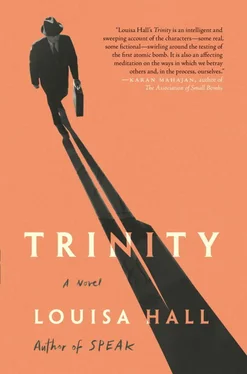I stood just outside the doorway, hesitating to intrude on a meeting that wasn’t intended for me. But even so, I stayed where I was in the foyer and listened while the scientist at the lectern said that, up until now, we’d been racing the Germans.
But now Germany had surrendered, he said, and Japan didn’t have a nuclear project.
Japan was, he said, for the most part already defeated, by sea and by land and by air. Our naval blockade had ruined their economy, and our bombing campaigns were systematically destroying their cities. At least 85,000 civilians, this scientist stressed, had been killed in the firestorm in Tokyo. Nearly 9,000 tons of jellied petroleum incendiaries had been dropped on Nagoya, Osaka, and Kobe.
We’re already burning them alive, this scientist said. We don’t need this weapon to do it.
Then he stopped talking abruptly, staring out at that sea of men as though he’d suddenly realized that there wasn’t a face he knew in the whole bunch. I felt for him, I really did, and I almost wanted to wave at him so he knew that I saw him, but then a few scientists stood up and applauded, and he looked reassured, and descended the stairs from the lectern.
Then I turned and looked outside. The sun had begun to peek through one rift in the clouds, and though it was still raining hard, the rain was now illuminated by sunlight, silver slanting diagonally down through the aspens. And inside the chapel, a new scientist had climbed up to the lectern and said that if we did continue, we should be obligated to share any developments in the project with Russia.
This weapon, he said, shouldn’t be used as a negotiation point. We shouldn’t play diplomatic games with this weapon.
And furthermore, he reminded us, the Russians had lost tens of millions of men fighting Hitler, while we debated joining the war. For now, he said, they’re still our allies. But if we don’t share our secrets with them, we’ll be making them our enemies. They’ll have no choice but to defend themselves against the threat of the secret weapon we’re making.
Then he sat down, and Bill Friedman stood up and said that he agreed, and that anyway, as every physicist should understand at this point, the whole concept of operating according to national boundaries was foolish.
He said such boundaries were hypothetical in a day and age in which whole nations could be destroyed by one weapon.
And what about radiation, he said. And what about fallout. Do they operate according to national boundaries?
By then the sun had gone out again, and the rain stormed down through the leaves, causing them to fall as if it were autumn, to swirl down to earth or to cling to the wet black trunks of the trees like notices on telephone poles.
There’s no conscionable reason to actually drop one of these weapons on a Japanese city, Bill said. Then he banged his fist on the lectern. If we are going to continue work on this weapon, he said, we need some kind of guarantee that it won’t be dropped.
Test it, sure, he said. But what possible use could there be in destroying another Japanese city.
Then the chapel filled with applause, and Bill returned to his seat, and contemplating those words— radiation and fallout, words I’d never heard of and couldn’t imagine—I felt awfully uneasy. And then I caught sight of Jack. He was sitting in the second row beside Oppie.
There was Jack’s head. I felt it in my stomach: the weight of that head, which I’d known on my shoulder, when we sat beside the lake and looked out on the water.
And because I was looking at him, watching the back of his head, I saw Oppie rise and move toward the lectern. It was difficult for me to tear my eyes away from Jack’s head, but still, every so often, I did look up at Oppie. I remember how he looked, standing up there at the lectern: his hat, his heavy eyebrows, how thin his neck was.
By then, the rain was pounding so hard it was difficult to hear what he was saying, and I had to lean forward to make it out when he said he understood the scientists’ concern.
He said he would do everything in his power to communicate to the generals the necessity of sharing information with Russia. And he swore, in addition, that he would do everything in his power to advocate only testing the weapon.
But, he said, even if, in the worst-case scenario, it were used once, dropped on one Japanese target, he truly believed that it would function as a preventative measure.
A horrible loss of life, he said. And yet. What if that single demonstration of the weapon’s unspeakable effectiveness finally caused the governments of the world to comprehend that war is too dangerous to be waged?
Imagine, he said, how many lives could be saved by such a prohibitively dangerous weapon.
That’s what our work could amount to, he said. A violence to end all other forms of violence. A weapon to end the use of all weapons.
Meanwhile, in the chapel, the mood had started to shift. Now people were nodding. All the good scientists of Shangri-la who had gathered there in the chapel were beginning to feel a little more hopeful, and a little more proud of the work they were doing, so by the time Oppie had finished talking about how, in any case, all of us were scientists, and a scientist’s primary duty was to know, to know and understand the world as he saw it, you knew those men would stay on the mesa.
Then Oppie sat down beside Jack. And meanwhile that storm headed off down the mesa, and the sun began to shine through again, and the aspens stood up and shivered.
Then it was quiet, and no one else went up to speak, and finally the scientists began to filter out of the chapel. Outside, it was one of those lemony evenings after a rain’s washed the sky clean, and I was standing there in the sunlight, wearing my yellow dress, smiling at those men as they passed.
And then Jack had also gone by, barely glancing up to acknowledge my presence, and when he was gone I stood slain in his wake.
For comfort, I had to repeat: A violence to end all other forms of violence. A weapon to end the use of all weapons.
And for some reason, those words gave me hope. They made me feel somehow hopeful and strong, like a person who could bear any blow. Like a person prepared to get all the way to the bottom, which maybe explains why, when Oppie walked past after Jack, I had the nerve to touch his sleeve and say, “Thank you.”
He glanced down, and though I wasn’t meant to be there at all, he didn’t look exactly surprised. His head was tilted off to one side, and I’m not sure I’ve ever seen such an unhappy expression.
Later I learned from some disgruntled scientists that even before that meeting was held in the chapel, the target committee had already convened in Oppie’s office to determine which Japanese cities would be the first targets. So Oppie must have known they’d be dropped and not merely tested, despite what he’d said up there at the lectern. But I didn’t know that back then. At that point, when he saw me in the doorway, it only seemed as if, despite all that grinning, and the dancing in the lodge, and the waving from the jeep, he was actually a terribly unhappy person.
He looked down at me in the doorway as if I were a ghost he’d seen many times. As if he knew just who I was, or who I’d been, and why precisely I’d come back to disturb him.
FROM THAT NIGHT ON, THE WIFE BEATER AND I OFTEN ATE AT FULLERLodge after work.
The food there was better than the food at the PX, and though the wife beater was less senior than Jack, it did make me feel somewhat important, or at least somewhat involved, to be sitting there with him and his friends from explosives.
Because they’d only just come to the mesa, you could see how much they were enjoying the camp-y feel of the place, wearing their checked shirts and their blue jeans, like the most recent guests to show up at the dude ranch. There they sat at our long wooden table, merrily scraping their Fiestaware plates, describing a mountain lion they’d heard the previous night, or the inefficiency of the Indian girls who came up in the mornings. And meanwhile I laughed, and advised them on the best place to go swimming, and the whole time, I hoped that Jack would come in and see us.
Читать дальше












